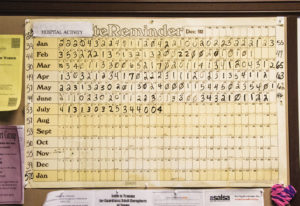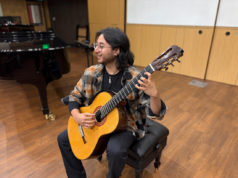The call center at the Women’s Center of Tarrant County is small and unassuming at first. One woman, one telephone, a few framed certificates on the wall. Nothing out of the ordinary. But then the phone rings.

A large yellow calendar behind the desk displays a running total of phone calls received from victims each month. In January 2014, counselors came to the aid of 40 victims in hospitals. This January, 55 victims in hospitals received assistance.
So far in 2015, the center has seen a rise in calls, though summer and spring are usually the busiest times of year.
“When the heat goes up, it does seem to have an effect on violence,” said Becka Meier, the Women’s Center’s clinical coordinator, hinting that no relief from the heat can lead to bad decisions.
These numbers don’t reflect the number of crimes committed overall, since sexual assaults are among the most underreported crimes in the nation. In April, a study conducted by the University of Texas at Austin found that two out of five Texas women will be sexually assaulted in her lifetime.
As survivors strive to overcome their abuse, returning to college is a common step toward recovery, Meier said. This may either stem from their desire to move on from their experiences or from a newfound interest in helping others.
“Sometimes it’s directly related,” Meier said. “They want to learn more about how to help victims and how to give back.”
The majority of victims who visit the center are minors, ranging from 3 to 17 years old. However, many survivors do not seek help until later in life, struggling privately and in silence for years.
April Anderson was one of these survivors. She was the victim of numerous sexual assaults by a family member, beginning at age 3. Those early years of attacks caused severe emotional damage, resulting in depression and substance abuse, which followed her throughout most of her adult life.
“I had to overcome all of that and be able to get emotionally stable and to a point where I could actually begin to focus on me again,” she said.
When it came to her romantic life, April said she was never truly happy in her relationships.
“Something was always different, like I was never really healthy,” she said.
After surviving a physically abusive husband, she reached her lowest point last September. That’s when she tried to kill herself.
“I just knew I couldn’t continue to live this way anymore,” she said. “I needed to seek some help.”
Last year, she decided to visit the Women’s Center. Though painful, she said her experiences have humbled her and helped her gain perspective, which she hopes can serve as an asset in her future career.
This summer she will complete her associate’s degree at TCC before pursuing her bachelor’s at the University of North Texas. Her painful experiences have led her to a career in social work. She said she hopes to use the empathy she gained from her years of struggle to help others through the healing process.
Healing “doesn’t just end,” she said. “It continues.”
******











